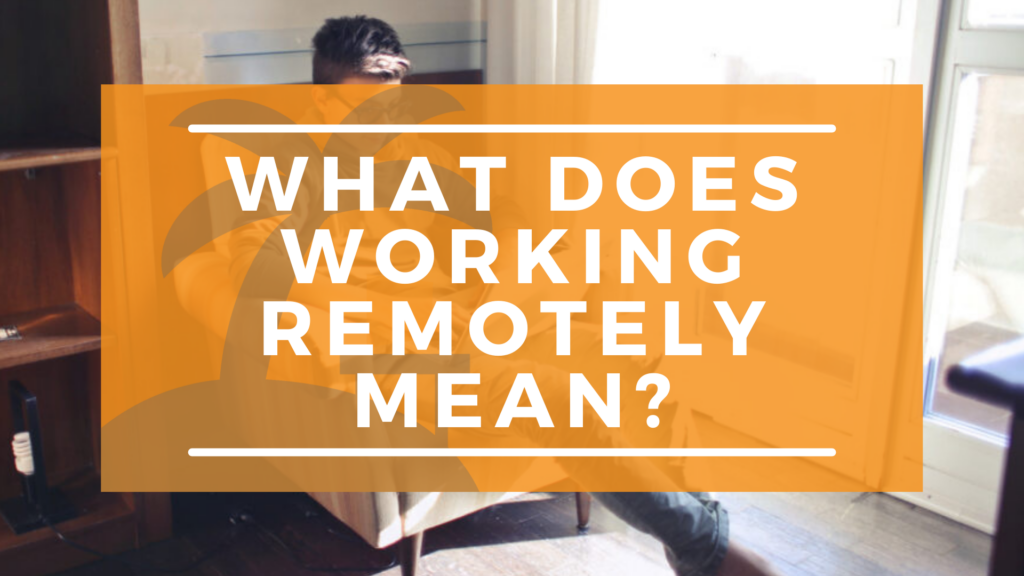
Businesses, companies, and brands have been affected significantly by the coronavirus pandemic, with some of the most prominent establishments in the world closing until further notice and some household names going under. Some people might look at it as a sign of weakness.
Still, nobody was prepared for the challenges that the novel pandemic threw at the world, as it shook even the most meticulous of organizations in remarkable ways.
However, necessity breeds innovation, and there’s a way that people companies, brands, and individuals can combat the mundane situation. That way involves working from home, better known as remote working.
Remote working is when you do the work that is typically associated with the office from home, and you move your operations out of the office vicinity to a more remote location. Remote working is as tricky as it might sound, as all you need to know will be made available in this piece.
Here, we will be introducing you to the concept of remote working, showing you what working remotely truly means and why it has become the business of the day. We will also tell you a bit about working remotely, why working remotely is beneficial to workers and employees, and why it more than serves the purpose.
We will also show you the tools needed in remote working and why the Internet is indispensable in such an activity.
So without further ado, let’s get to working from home and creating things usually associated with on-site working.
About Working Remotely

Working remotely isn’t as complicated as some people make it seem to be, and it could be an absolute breeze as long as you know what you’re setting out to achieve. It is one of the best ways to ensure efficiency if it’s done correctly, and it would surprise you how many top-notch brands utilize its features regularly. Here are some of the benefits of working remotely and why it seems as though it’s here to stay.
Better Health and Wellness
A strict on-site attendance policy isn’t healthy for the average person, it might look good on paper, but it could turn out dire in the long run. That’s backed up “in a report published by Royal Society for Public Health in the UK, they found that 55% of participants felt more stressed as a result of their commute.”
Working from home does wonders to an employee’s psyche, as the person knows where the bed is if he or she is feeling tired and where the workstation is, as soon as the same person has adequately rested. As they say, health is wealth, and the only way a company can grow is if the company has healthy and well-meaning individuals handling their duty posts.
Renewed passion for their job
Most of these people aren’t disappointed because of the beginning of a working week. Instead, they feel utterly disillusioned with the hustle and bustle that on-site working assures.
These same people show a renewed sense of passion and enthusiasm when they can work from home, and that passion translates to better results. Companies need to have employees who are up to speed, super inspired, and ready to get the job done in the best way possible.
Allowing them to work remotely is one of the easiest ways to do so. It should be encouraged with an investment into such facilities that can make the remote working model possible.
Cost Savings
Whether you believe it or not, remote working saves money, and it is more cost-effective in the long run compared to on-site working. That’s because “if a team is fully distributed, companies can see decreased overhead from money saved on costs like rent and office furniture.”
Such saved money can go into other important things, such as providing WiFi services for the remote workers, setting up professional video conferencing platforms for the team, and subscribing to Netflix for a united chilling regime after a good week’s job.
What Do You Need to Work Remotely?

Now that you understand the potential merits of working remotely, it’s high time you know the things that are needed in this proposition. Remote working is much more than buying data for employees or sharing zoom meeting links to a group page and involves more than meets the eye. Here are some of the essential tools that will make a small working gig something to look forward to!
Computer
The first thing on the list happens to be the most obvious, and there’s no way you can work remotely without having a dedicated computer to act as your companion in this mundane task. Computers are needed in every workplace today, and more so when your workstation is your computer.
Many companies provide their employees with company laptops, which boost their flexibility, and give them a medium to do company work even when they aren’t at the site.
However, a computer for remote working needs to be a little more sophisticated than your typical everyday computer. A small working computer must have word processors such as the Microsoft package, and it must have an internet server, which you would use to partake in online conferences.
It should have a webcam and a working microphone. Once your work laptop has all of this, videoconferencing and working remotely would be a whole lot easier.
Dedicated Phone Line
You need a work phone line, a phone line that you can readily be reached by your superior during office hours, and a phone line that wouldn’t be bugged to avoid detrimental leaks.
This could be a landline, or it could be a standard telephone line which your friends do not have. The reason being that you should know it’s for work and that any call coming into that line is from a superior, partner, or junior at your place of work.
Internet Connection
Without Internet, there’s hardly any real work you can get done remotely, and you might as well start coming for face-to-face meetings at the on-site facility. Internet is one of the greatest gifts of technology, and remote workers are implored to utilize it as frequently as possible.
A subscription to a “reliable, high-speed (usually 3 – 5 megabits), hardwired, internet connection, like DSL or Cable, is what most companies require.
One of the best parts about working remotely is that companies are now providing free Internet for their company workers, meaning that the days of using your data to do company work are long gone.
Printer and Scanner

There’s a reason why almost every office in an on-site establishment has a printer and scanner, and it’s for that exact reason why remote working employees should have theirs too. You might be wondering why such an investment is necessary, but the fact remains that you’ll need to sign contracts, draft forms, and prepare W9s, meaning that those gadgets would come in pretty handy.
A Quiet Room in Your Abode
Remote working could be such a breeze as long as you are afforded the peace needed to get the job done. When working from home, your friends or family sharing the house with you must understand that there’s a time for serious work. Once you can create boundaries, draw respected lines, and gain their support, nothing stops you from having a serene working experience.
Final Thoughts
What does working remotely mean, and what does it entail? That is a question that has been asked for ages, but surprisingly it doesn’t get enough correct answers. Working remotely is the act or art form of working in a location away from your on-site office and getting the job done with similar efficiency.
Working remotely or from home is not for everyone, as some people genuinely prefer working in their on-site locations.
People working from home enjoy numerous perks, but you can only realize those perks if the proper steps are taken. We have to give you the working model; now it’s time for you to implement it!
Comments are closed.